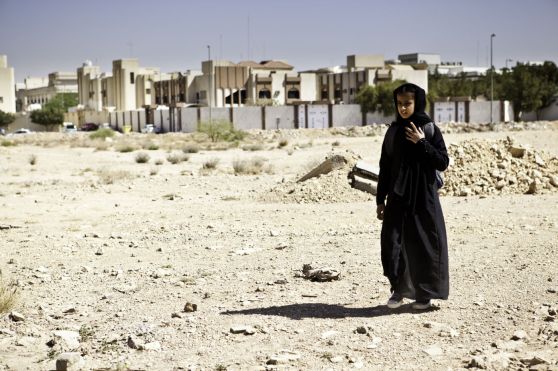 Last week Wadjda finally came to cinemas here in Germany. Ever since I first saw the trailer for Haifaa al-Mansour’s film, I knew this film was going to be worth going to see – not only in a historical sense, this being the first feature film to be filmed by a woman in Saudi Arabia, but also because the concept was so appealing. Recently I have been watching a couple of documentaries about Saudi Arabia and the film provided ever more insight into what is a relative unknown. Sure, we have vague images of what Saudi Arabian life is like, and the odd film snippet, but this was the first film to be shot entirely on the streets of Riyadh and therefore offers so much more.
Last week Wadjda finally came to cinemas here in Germany. Ever since I first saw the trailer for Haifaa al-Mansour’s film, I knew this film was going to be worth going to see – not only in a historical sense, this being the first feature film to be filmed by a woman in Saudi Arabia, but also because the concept was so appealing. Recently I have been watching a couple of documentaries about Saudi Arabia and the film provided ever more insight into what is a relative unknown. Sure, we have vague images of what Saudi Arabian life is like, and the odd film snippet, but this was the first film to be shot entirely on the streets of Riyadh and therefore offers so much more.
I watched a couple of interviews with al-Mansour before going to the cinema and was really impressed by what she had to say – I was also particularly interested in what she had to say about her previous work and this is something I would love to see.
Wadjda is a heartwarming, humorous and, at times, deeply moving portrayal of so many aspects of life in Saudi Arabia today – despite the premise that the film is about a girl and her longing for a bike, the film is about so much more. Throughout we learn about her relationship with her mother, her father, other girls, boys, religion, and social values and pressures. Wadjda lives with her mother – we see how her mother struggles with the burden of socials pressures in a different way to her daughter. Here we begin to see a generational gap, further represented by Wadjda’s friendship with Abdullah (an unrelated boy, and thus a friendship that would be frowned upon). Wadjda’s mother is mostly very supportive of her daughter, occasionally pulling her back when she thinks she is on thin ice. Wadjda is a wonderfully confident and self aware character, but al-Mansour doesn’t allow her to become unrealistic or unconvincing. When two girls at school are caught up in what the headmistress believes to be a lesbian ‘scandal’, Wadjda doesn’t seize the opportunity to save the girls from ostracisation and punishment.
Throughout the film we learn of many the many restraints that Saudi women face, but we also learn of some chances that have started to bring around change – Wadjda’s mother has a friend who works at the hospital without a full veil, for example. Wadjda’s mother is, however, still very socially immobile. Wadjda’s grandmother is looking for a bride for her father as her mother almost died while giving birth to Wadjda and can no longer provide the son the family wants. When the father finally decides to marry someone else, she loses her much needed male guardian, which shows how reliant Saudi society makes women on the men who surround them. This is obviously also seen in the need for a driver – Wadjda’s mother has to take time off work because she can’t get herself there, so that even when women try to seek independence, something outside of their control still holds them back.
At school we see how the headmistress trains the girls to accept a second place in society, ushering them inside when they are in the eye line of a man, discouraging individuality and using veiling to bring troublesome pupils back into line.
This film covers so many different levels of Saudi society in such a beautiful, and interesting way. This film is easily one the best I have seen in a long time and is truly a masterpiece. – It is well balanced, believable and honest.
Pingback: GAZE 2015 – A Sinner In Mecca | Ashes to Gold